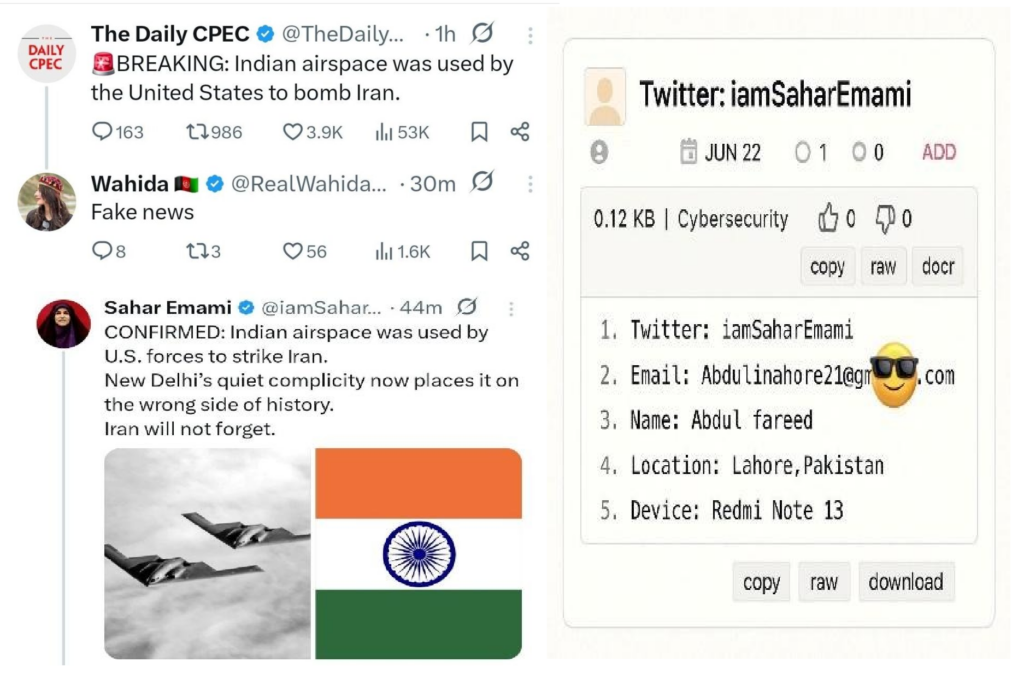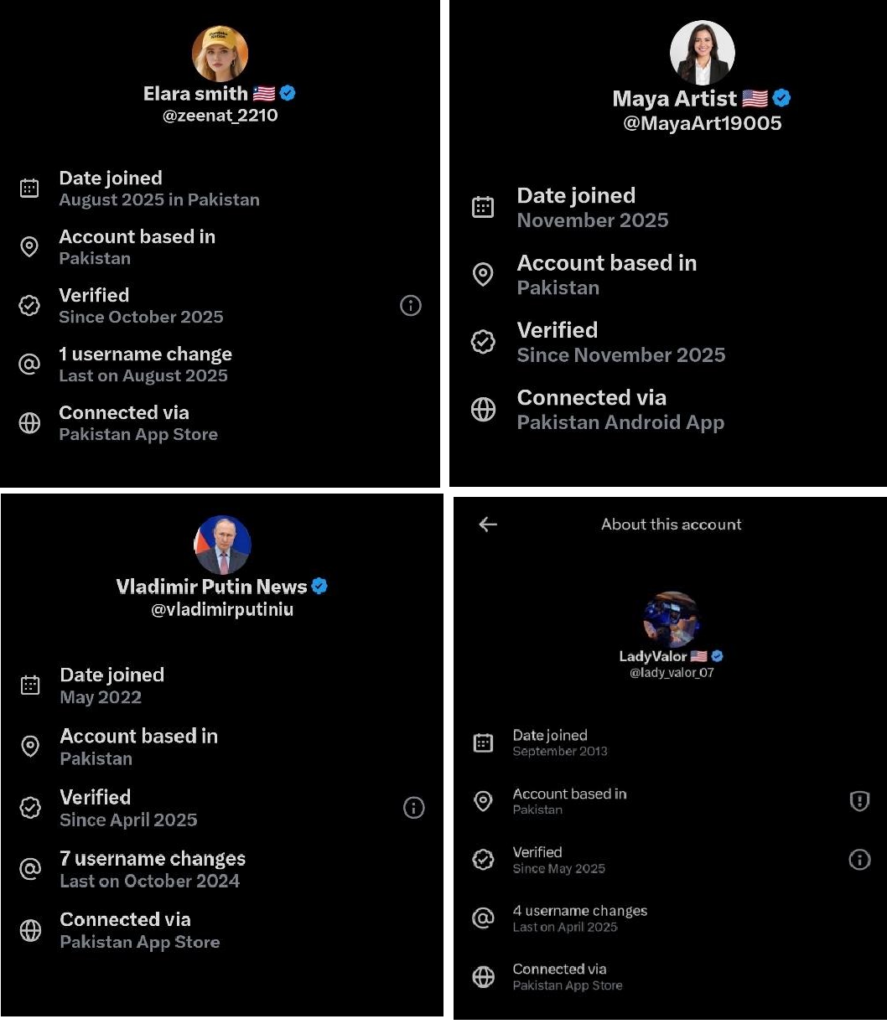
- The new “About This Account” feature reveals that several prominent Indian political handles—especially government critics—are registered abroad, reinforcing concerns about coordinated foreign influence on India’s online narratives.
- The new label has exposed unsettling patterns: many accounts pushing divisive or anti-India narratives, while posing as domestic voices on Indian politics, are actually operating from abroad.
- What was once conjecture that many “Indian” political voices online were, in fact, operated from abroad is now being confirmed in the open.
- The feature isn’t perfect and still needs technical fixes, but it’s already a valuable asset for India as it gives users a new way to judge the authenticity of narratives, especially those aimed at undermining unity or stirring social fault lines.
This week, Elon Musk-owned X rolled out a transparency feature called “About This Account” that shows the country or region where a user’s account is based, which in turn has opened a Pandora’s box. While the stated purpose is to help users assess the authenticity of voices on the platform, the feature’s early rollout has revealed a striking pattern: many politically influential Indian handles, especially those critical of the government, are not based in India at all. According to national observers, this confirms what many in India have long suspected: a coordinated foreign effort to influence domestic narratives.
What Is the Feature and Why It Matters
Under the new system, when one clicks on a profile’s “joined” date, an “About This Account” panel opens up, disclosing:
- The current “based in” country or region of the account
- How many times has the username changed
- Whether the app was downloaded from a certain app store
X says it is doing this to help users “better assess the authenticity” of accounts, including spotting bots, AI-operated handles, or foreign propaganda networks.
For users in regions with restrictive speech laws, X has also provided a “privacy toggle” so accounts can show only a broader area (e.g., a continent) rather than a specific country. But critics still worry that many politically active accounts will continue to mask their true origin unless forced to be transparent.
What’s Emerging: Anti-India Narratives Run from Outside
Thanks to this label, several disquieting trends have come to light. According to a detailed investigation, numerous X accounts that routinely comment on Indian politics but promote divisive or anti-India narratives turn out to be based abroad. Some primary examples are:
- Alt News, a well-known “fact-checking” handle, now shows up as “based in the United States” on X. For years, Alt News has presented itself as rooted in India, but this label calls its claimed local identity into question.
- Accounts focused on caste or communal politics show ambiguous “South Asia” labels, rather than India, raising suspicion about intentional obfuscation.
- The Tractor2twitr_P handle, which was very active during the farmers’ protests and played up Sikh identity, is now tagged “based in Australasia,” despite its apparent Indian local ties.
- A handle called haraappan, known for polarising discussion around North vs. South India, is now shown to be based in Bangladesh.
- Two accounts, “Diya Sharma” and “Yashita Nagpal” previously seen pushing Congress-aligned or anti-Hindu content, are now flagged as being run from Pakistan.

These revelations are deeply unsettling for many because they suggest that a significant portion of highly vocal, politically charged “Indian” voices on X may not be Indian at all and instead are part of a broader and potentially coordinated foreign discourse operation.
Political Fallout in India
Unsurprisingly, the BJP has seized upon these revelations. According to India Today, the party has claimed that this feature validates its long-standing warnings about foreign interference. Amit Malviya, BJP IT Cell Chief, cited multiple handles that, under the new system, appear to be run from Pakistan, Bangladesh, and other parts of Asia. He called it a “coordinated global operation to influence India’s social discourse, spread misinformation, and deepen internal divisions.”
Indeed, many on social media are now re-evaluating prominent accounts that have traditionally shaped narratives around farmer agitation, caste politics, and communal grievances, now seeing them in a different light, given their foreign base.
For example, the account below, which was quite active during Operation Sindoor in spreading vicious propaganda, now turns out to be from Pakistan.

The Mechanism of Influence: Opacity, Anonymity, and Narrative Engineering
Why did these accounts operate under the cover of Indian identity for so long? To understand, we need to look at two interlinked strategies:
- Opacity and Regional Ambiguity
By selecting a region-level label (e.g., “South Asia”) instead of a country, handles preserve a cloak of ambiguity. This allows accounts to sidestep full transparency while still participating in India’s political conversations. This selective ambiguity has shielded many from scrutiny until now. - Narrative Positioning
These foreign-run accounts have often positioned themselves as grassroots or people-oriented voices. Their critiques on caste, religion, or agrarian issues have appeared as organic dissent, but with their hidden location exposed, one now questions whether they were cultivated to stoke divisions from afar, rather than genuinely emerging from within India’s social fabric.
The effect is two-fold: manufactured outrage or support on politically sensitive issues, and a plausible deniability for foreign actors who wish to influence Indian public opinion without disclosing their geographic origin. Interestingly, accounts of many MAGA supporters who were staunch anti-India in their stance have also turned out to be from Pakistan.

Risks and Caveats: Accuracy and Privacy Concerns
That said, the new feature is not without its flaws and critics. Several analysts have highlighted potential inaccuracies:
- VPN and Proxy Risk: X itself warns that VPN or proxy use can distort the “based in” country label.
- Data for Older Accounts: During rollout, location information for some older accounts was removed because the creation data was not “100% reliable.”
- Privacy Tradeoffs: While X offers a region-level display to help protect some users, sceptics argue this isn’t enough for politically sensitive individuals and that the feature could still be used to shame or target dissenting voices.
X’s Head of Product, Nikita Bier, has acknowledged “rough edges” in the rollout and promised further refinement. Still, for many Indians, the early benefit is hard to ignore: this feature brings long-simmering suspicions into the open.
Why This Validation Matters for India
For years, Indian policymakers and political actors have warned against foreign actors using social media to influence domestic debates. The ability to pose as local, to post in Hindi or Punjabi, and to amplify divisive issues has been a powerful tool, especially when such accounts could steer public sentiment without being traced back to their origin.
Now, with X’s transparency layer, this hidden architecture of influence is being exposed.
- Strengthening Accountability: Ordinary users can now check where a political broadcaster is really based, giving them a tool to question the legitimacy of often performative activism.
- Reducing Impersonation: Handles that have masqueraded as local voices while broadcasting foreign-funded or non-local agendas may now be discredited.
- Supporting National Security: For governments worried about foreign interference in domestic social media debates, this tool provides a form of signal intelligence, albeit imperfect, about who is shaping online conversation from outside.
The Broader Implications: A Global Trend in Social Media Transparency
India’s case is not unique. Globally, platforms are grappling with foreign interference, polarisation, and disinformation. X’s move reflects a wider trend: social media companies are being pushed to provide more “account provenance” rather than leaving everything to user bios and self-declared identities.
On the other hand, this transparency comes with new tensions. Questions persist: Will more disclosure invite harassment? Will state actors weaponise location data for a crackdown on dissent? Can the feature remain accurate enough to be meaningful?
A Turning Point for India’s Digital Discourse
X’s “About This Account” feature may feel overdue, but its implications are seismic for India. What was once conjecture that many “Indian” political voices online were, in fact, operated from abroad is now being confirmed in the open. The country labels are not just a cosmetic change; they unmask an ecosystem that has quietly shaped political fault lines, often from thousands of miles away.
While the feature is not flawless, and X must iron out technical issues, its debut is already proving to be a powerful tool for India. It offers users a new lens through which to evaluate the authenticity of narratives, especially those that challenge national unity or exploit social divisions.
For India, this is more than digital transparency: it is a vindication of long-held concerns. And for those foreign operatives hiding behind local identities, it may be the beginning of real accountability.
Diksha Bharti is currently pursuing a Master’s program in Russian studies. She has previously worked as a Research Associate at Politika and the Consilium Research Institute. She has a keen interest in geopolitics and has contributed to several reputed platforms. Views expressed are the author’s own.
